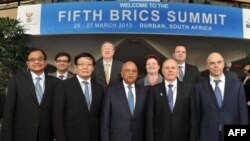DURBAN, SOUTH AFRICA —
The nations that make up the BRICS - Brazil, Russia, India, China and South Africa - are meeting in Durban for their fifth annual summit. This year's theme is cooperation with Africa. Trade between Africa and the BRICS has grown so quickly in the past decade that it is being compared to the scramble for Africa, Europe's 19th century colonization of the continent.
Last year, the African Union inaugurated its brand new headquarters in Addis Ababa, Ethiopia. The headquarters was financed by China and built mainly with Chinese labor. It is a symbol of Beijing's growing influence in Africa. China's direct investment on the continent reached $20 billion last year, and the country accounts for two-thirds of the BRICS' trade there. This fact worries Gilbert Mosena, the secretary general of South Africa's National African Chamber of Commerce and Industry.
“Normally, when you trade with bigger brothers, like China, Russia and so on, we should guard against a situation where our economy can be dominated by a well-structured, well-dominated economy,” Mosena said.
Trade between China and its African counterparts weighs heavily in favor of China, which imports raw materials and exports manufactured goods. Earlier this month, Nigeria's central bank governor warned that Africa risked “opening itself to a new form of imperialism."
But Simon Freemantle, an analyst for the South Africa-based Standard Bank, says the BRICS' involvement in Africa cannot be compared to the European colonization of the continent.
“African countries sit on abundant resources. We have agriculture potential which nowhere else in the world has. So Africa is in a great position and I think the way we negotiate needs to be pragmatic and quite hard-nosed. Whether this will be a neo-colonial relationship entirely rests on African countries and African governments. And it shouldn't. And it needn't,” Freemantle said.
During a visit to Tanzania, Chinese President Xi Jinping insisted on the need to “respect Africa's dignity and independence.” Lynette Chen is chief executive officer of the business council for NEPAD, the African Union's development agency. She says the Chinese are treating their African counterparts on a more equal footing than Western countries. She says, therefore, it is up to the Africans to assert themselves.
“It's a symptom of Africa's colonial past, the matter in which the Bretton Woods institutions have invested in Africa, with a lot of conditions. I think the African governments have felt powerless in terms of putting forward their demands. It wasn't the traditional way. What needs to be redefined is the terms of engagement of these contracts. And I think the Chinese government is willing to comply with those,” Chen said.
Chen says it has the potential to signal a change in global economic relationships.
“It's a very exciting time because the BRICS countries can get together to figure out their own set of rules. And that, I think that the West, the global economies, will have to be cognizant of,” Chen said.
In Durban, the BRICS will be launching their own development bank, which will be the first concrete step toward formalizing their economic cooperation. Analysts say the move should give them more influence on international affairs.
Last year, the African Union inaugurated its brand new headquarters in Addis Ababa, Ethiopia. The headquarters was financed by China and built mainly with Chinese labor. It is a symbol of Beijing's growing influence in Africa. China's direct investment on the continent reached $20 billion last year, and the country accounts for two-thirds of the BRICS' trade there. This fact worries Gilbert Mosena, the secretary general of South Africa's National African Chamber of Commerce and Industry.
“Normally, when you trade with bigger brothers, like China, Russia and so on, we should guard against a situation where our economy can be dominated by a well-structured, well-dominated economy,” Mosena said.
Trade between China and its African counterparts weighs heavily in favor of China, which imports raw materials and exports manufactured goods. Earlier this month, Nigeria's central bank governor warned that Africa risked “opening itself to a new form of imperialism."
But Simon Freemantle, an analyst for the South Africa-based Standard Bank, says the BRICS' involvement in Africa cannot be compared to the European colonization of the continent.
“African countries sit on abundant resources. We have agriculture potential which nowhere else in the world has. So Africa is in a great position and I think the way we negotiate needs to be pragmatic and quite hard-nosed. Whether this will be a neo-colonial relationship entirely rests on African countries and African governments. And it shouldn't. And it needn't,” Freemantle said.
During a visit to Tanzania, Chinese President Xi Jinping insisted on the need to “respect Africa's dignity and independence.” Lynette Chen is chief executive officer of the business council for NEPAD, the African Union's development agency. She says the Chinese are treating their African counterparts on a more equal footing than Western countries. She says, therefore, it is up to the Africans to assert themselves.
“It's a symptom of Africa's colonial past, the matter in which the Bretton Woods institutions have invested in Africa, with a lot of conditions. I think the African governments have felt powerless in terms of putting forward their demands. It wasn't the traditional way. What needs to be redefined is the terms of engagement of these contracts. And I think the Chinese government is willing to comply with those,” Chen said.
Chen says it has the potential to signal a change in global economic relationships.
“It's a very exciting time because the BRICS countries can get together to figure out their own set of rules. And that, I think that the West, the global economies, will have to be cognizant of,” Chen said.
In Durban, the BRICS will be launching their own development bank, which will be the first concrete step toward formalizing their economic cooperation. Analysts say the move should give them more influence on international affairs.




